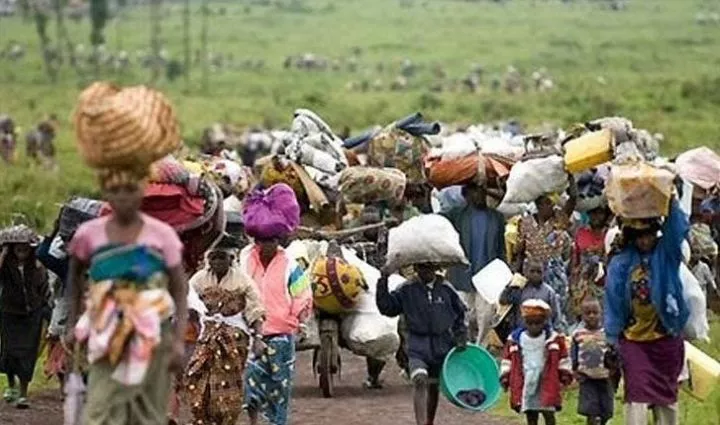
"The cloud is gathering and becoming darker by the day. Danger lurks around as hunger and starvation bite harder. Nigerians are running out of patience with the government, and if urgent steps are not taken by the government to arrest the ugly trend, something disastrous might happen," that was how a Katsina-based educationist, Mallam Sabiu Ibrahim, captured the current socio-economic realities in Nigeria.
The recent disclosure by the Federal Government that over 400,000 Nigerian refugees currently reside in Chad, Niger and Cameroon, is a sad reality of what Nigeria has become.
The report has sparked outrage among Nigerians who have attributed the development to poor and ineffective leadership.
The Federal Commissioner of the National Commission for Refugees, Migrants and Internally Displaced Persons (NCFRMI), Tijani Ahmed, made the disturbing disclosure in Abuja last week during a technical working group meeting.
Ahmed explained that the meeting was summoned to ascertain what had been done earlier, what the committee intends to do, and to evaluate areas to seek government intervention.
He added that the committee would explore areas to involve other key stakeholders like international partners.
He said: "We are here to discuss the repatriation of Nigerians living in Cameroon and Chad, where we have a tripartite agreement signed by the government of Chad, Nigeria and the United Nations High Commissioner for Refugees (UNHCR). Last week, we were in Chad where repatriation has taken place and we are hoping that the repatriation will continue in Chad.
"We summoned the technical working group meeting, which is a sub-committee responsible for the repatriation of Nigerians back to the country, to discuss ways and means that we will use to ensure that Nigerian refugees return to Nigeria.
"As it is today, we have no less than 400,000 refugees across the zones of Cameroon, Niger and Chad.
"Three thousand were returned last week Sunday through the efforts of the Governor of Borno State. And the technical working group wants to take off from there because the tripartite agreement has already been signed between Nigeria and Chad.
"We have reviewed the processes to consider what is required of us before the continuation of this repatriation. We will also resume the repatriation of those in Cameroon soon. So, we hope that repatriation will come to stay in the next few weeks and we will continue the exercise."
Speaking on the development, the Deputy Representative of the UNHCR in Nigeria, Bernadette Muteshi, said the agency was committed to ensuring that the agreement signed by both countries was adhered to.
She said: "We are leaning greatly on the governments responsible for leadership and ownership of the process.
"We are here to walk along with both governments to ensure that the contents of the tripartite agreement are followed and adhered to.
"Honestly, it's really about both governments taking leadership and ownership for their nationals in this particular exercise."
However, to underscore the urgency of action required by those in government to end the ugly trend, a similar incident, if not worse, happened last year.
In last year's incident, a video emerged on social media, where about 40,000 Nigerians, according to the voice in that video, were being received in Niger Republic, where they had run to take refuge.
Last year, the economy became so gloomy and dire such that hunger was spreading agony and sorrow across many households in Nigeria.
Food became a luxury and serious existential threat to millions of Nigerians.
It got to a point where people took to the street in their thousands in states Niger, Kano, Oyo, Lagos, and Sokoto, among others, to protest what they called the high cost of essential food items, which prices had gone beyond the reach of ordinary men in the street.
Starting from Niger to Kano, Sokoto, Lagos, Oyo, and Katsina states, among others, the masses sang the same song. They said they could no longer bear the pains of the government's economic policies, which had made life unbearable and hellish for them.
Prices of staple foods like maize, rice, millet, guinea corn, garri and other food items, like beans, all hit the roof top, such that hunger and starvation became the order of the day.
To make matters worse, Niegrians are also under heavy attacks by various armed groups, ranging from Boko Haram Islamists sect to Fulani herdsmen militia, bandits and kidnappers, without any hope in sight. Kidnapping for ransom has remained a big business.
A former lawmaker in Katsina State, Yusuf Shehu, agreed that many Nigerians could be migrating to Niger Republic because of its proximity to Nigeria.
"It may not necessarily be due to hunger, starvation or insecurity because if you look at states like Katsina, Zamfara, Sokoto, and Jigawa, they have neighbouring communities on their borders that have a long history of living together with the people of Niger," he said.
However, considering the level of insecurity in some northern states, he believes that many people in some of those states would prefer to live in Niger or Chad if they see an opportunity.
"It is better for most of them that live in border towns to live in Niger or Chad than to live in those borders of insecurity. Don't also forget that Niger's currency is stronger than the Nigerian Naira currently," he added.
But, for Mallam Ibrahim, those Nigerians did not just migrate to those African countries because the countries were better than Nigeria.
According to him, they migrated to the places because they felt they could earn a living there and have their life and property protected.
"They couldn't just fold their hands and watch hunger and starvation ravage them.
"They needed a place to run to for survival and they felt those African countries could be better. Unfortunately, they got stranded as they discovered that things were not as they seemed.
"Also a good number of them are those who got stuck while on transit to Libya from where they planned to enter Europe through the Mediterranean Sea.
"So, it is not as if all of them planned to migrate to Niger or Chad. Those countries are trafficking routes to Libya and Algeria, which are transit points into Europe.
"Imagine the situation before the All Progressives Congress (APC) came to power and the situation today; it is an embarrassment. We are already sitting on a time bomb.
"Don't forget that over time, the north has suffered from poverty, hunger, deprivation and a whole lot of other ills from our so-called leaders, who never, and probably may never look out for the welfare of their people as their paramount responsibilities.
"So, to that extent, what you see is little compared to what will happen if the situation continues like this. More people will still embark on such journeys.
"Many even prefer to suffer and die in foreign lands than stay and die of hunger and starvation in their fatherland," he stated.
For the President of the Middle Belt Forum (MBF), Dr Pogu Bitrus, what happened was a true representation of the economic realities in Nigeria.
According to him, hundreds of thousands of Nigerians were already in Niger Republic, Chad, Cameroon and other African countries.
Many of them have been there since the economy took a dangerous dive with insecurity at an all time high.
"So, what you see is a true reflection of our current reality. There are a lot of Nigerians in Cameroon who are chased out of Nigeria because of insurgency and economic situation.
"That is just the reality, but as long as there is insecurity, people will migrate and move out of this country.
"But, if you talk of food, in spite of our problem, we still have more food than Niger Republic, Cameroon and Chad," he submitted.
Also speaking, Abdullahi Fago, an educationist based in Maiduwa Local Government Area of Katsina State, described the development as embarrassing.
He noted that "truly some Nigerians who live in border communities with Niger, have close socio-cultural ties with their kith and kin in Niger, who were separated by colonisation, but it has never been said that those in Nigeria are migrating to Niger because of hunger or insecurity as it is happening today."
He blamed the situation on the biting hunger across Nigeria, and the ravaging insecurity, which has prevented many farmers from going to do their farm work.
He, however, warned that if the government does not respond urgently to halt the trend, it would escalate to something more worrisome.
"A stitch in time saves nine. The government should do everything possible to avoid the looming danger.
"They should not allow the situation to degenerate beyond what is currently on ground, otherwise, what would follow is what nobody can imagine accurately," he warned.
Also speaking, a migration expert, Osita Osemene, believes that the government should do something to fix the country's economy.
He stated that fixing the economy and securing the lives and property of citizenry were the only way to halt Nigerians from moving in droves not only to Europe and America but to even smaller African countries in search of better life.
"This number is just a tip of the iceberg. There are more Nigerians who are in terrible situations in so many other African countries.
"I think our leaders should just help us. They should try to fix this country. Nigeria is blessed with abundant human and mineral resources and they should not be found in these kinds of situations.
"The only way to stop people from migrating in such a large number is to fix the country. If the Nigerian economy starts booming, with security of lives and property assured, some of these unnecessary migrations will stop.
"Mind you that many of those people were probably on their way to Libya or Algeria, from where they planned to escape to Europe through the sea.
"But, somehow, things did work out well for them and they got stranded. So, it is not as if they left Nigeria for Niger or Chad.
"As for those in Cameroon, you could say they might have been deceived to believe that things are greener over there. But, when they got there, it was a different situation entirely.
"The truth is that many of them were deceived. Yes, you could say it was easy to deceive them because things are not good in the country, but let us bear in mind that they were not given the true picture of the situation over there and that is always the situation.
"They won't tell you the truth because if they do, you may not want to go and these are traffickers who live off these migrants.
"So, I think our leaders just need to fix this country and all this nonsense will stop naturally," he stated.
















Comments